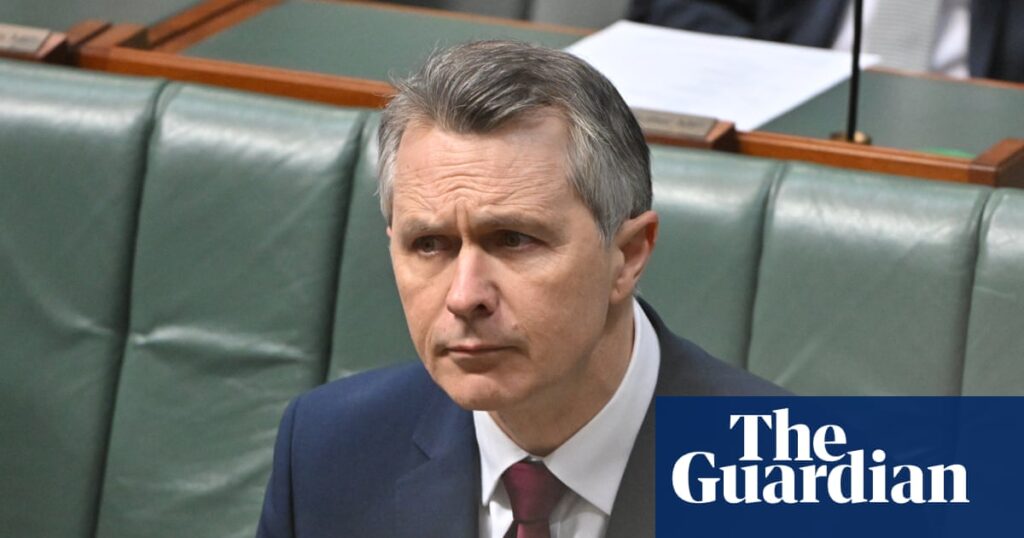More safety training for childcare workers, CCTV in centres and changes to working with children checks will be on the agenda for federal and state authorities, as governments scramble to respond to shocking allegations of abuse in early education centres.
Under new federal legislation revealed on Wednesday, childcare centres could lose federal funding from just one safety breach “strike”. But the education minister, Jason Clare, was unable to put a timeline on when a long-awaited national database of childcare workers could be set up, saying it would require joining up state and territory databases.
The Albanese government on Wednesday introduced an early childhood safety bill into parliament, which would give federal regulators power to punish childcare providers failing to meet standards and strengthen their ability to conduct unannounced service visits and spot checks.
Sign up: AU Breaking News email
“This is not about shutting centres down. It’s about lifting standards up and giving us the powers to make that happen,” Clare told a press conference in Parliament House.
The legislation gives the secretary of the education department new powers to refuse an application, or suspend or cancel an approval, for a provider to access the childcare subsidy, if that centre is deemed to be failing quality and safety standards. That decision can also be publicised. The early childhood education minister, Jess Walsh, called it a “stick” to encourage higher standards.
“This will signal to providers the importance of safety and quality and that additional services will not be approved for a provider with a poor track record in these areas,” states the bill’s explanatory memorandum.
“This means that providers or services who do not provide high quality and safe care are at risk of losing their approval to administer CCS, or may face other compliance actions.”
Additionally, childcare regulators will be empowered to launch unannounced visits to centres to investigate safety issues. Current legislation allows such spot checks to probe financial fraud issues, but the new legislation expands that power to focus on safety compliance “without consent” of the operator, following written authorisation of the education secretary.
“It could be as simple as one [strike],” Clare told the ABC, when asked about the threshold for cutting funding.
“It is important to make a point that regulators can shut a centre right now if they think there is a serious threat to children’s safety but this will give us the power to issue a … notice to a centre and say we will shut it within 28 days unless they meet that minimum standard, or to set conditions on them as well.”
The bill is expected to sail through parliament, with the Coalition and the Greens to not stand in its way. However, both parties are concerned the bill does not go far enough in addressing safety concerns in childcare, saying the government needs to move more quickly in corralling state and territory governments to set up a national database of workers and improve training among educators.
The opposition leader, Sussan Ley, said she would be “constructive” but the bill should not “be rammed through the parliament” so it could be examined closely.
“I’m incredibly concerned,” she told the ABC. “So I do want to be constructive, but that being constructive doesn’t mean giving the government a blank cheque when it comes to goodwill on this issue. We have to make sure that the legislation works.”
after newsletter promotion
Calls from childcare providers and safety experts for a national database of workers will be discussed next month at a meeting of state and territory education ministers, while attorneys general will discuss potential updates to the working with children check system.
The federal government cannot unilaterally make either change, with powers and data held by the states, but Clare said all levels of government were keen to keep the system safer.
Asked about CCTV, extra training for workers and the database, Clare said all those ideas would be “on the table”.
“I think the revelations in Victoria over the course of the last few weeks tell us exactly why [the national database] is so important,” he said.
“CCTV and the role that it can potentially play, in deterring a bad person from doing heinous things, and also helping police with their investigations, but also the sort of training, mandatory child safety training that already exists in the courses, but doesn’t exist in the classroom.”
But asked for a timeline on setting up such changes, Clare repeatedly declined to say how long it could take, only hoping it would happen “as quickly as possible”.
“The truth is this should have happened yesterday and this can’t happen fast enough, and states are already taking steps to expand their existing teacher registers,” he said.


